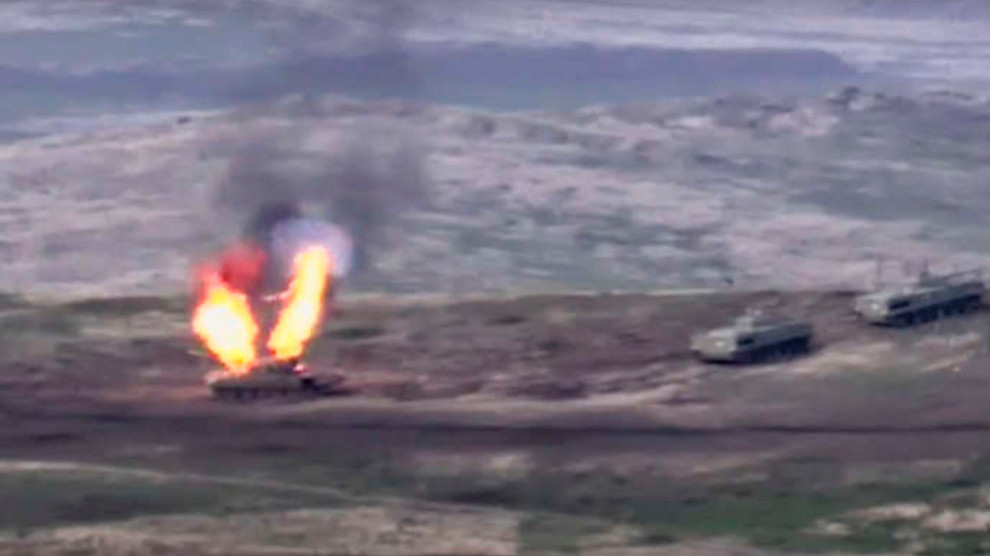Peace in Kurdistan condemns Turkish intervention in the Caucasus
Peace in Kurdistan supports the right of Nagorno-Karabagh to self-determination and opposes Turkey’s military intervention in the Caucasus.
Peace in Kurdistan supports the right of Nagorno-Karabagh to self-determination and opposes Turkey’s military intervention in the Caucasus.

The clashes that started on 26 September with the armed forces of Azerbaijan against Armenia with Nagorno-Karabagh (Artsakh), escalated over the weekend of 3-4 October with major population centres being shelled and a reported death toll of at least 240 people, although many more people may have been killed.
Peace in Kurdistan released a statement to express its "support the right of Nagorno-Karabagh to self-determination and opposes Turkey’s military intervention in the Caucasus."
The statement said: "Turkey has stepped into the tensions in the Caucasus, fanning the flames. Turkey’s Defence Minister Hulusi Akar claims a national affinity between Turkey and Azerbaijan justifies this belligerence: ‘Ties between Turkey and Azerbaijan are based on ‘two states one nation’ principle. We are always together, on good days and bad. We are on the side of our Azeri brothers in defence of their homeland.’
Azerbaijan claims Nagorno-Karabagh constitutes about 20% of its territory and that it has been illegally occupied by separatist Armenians and backed by neighbouring Armenia. Azerbaijan is Turkic-speaking and primarily Muslim. Azerbaijan’s capital, Baku, is the oil centre of the Caspian basin and hosts multinational corporations such as BP. Armenia is mainly Christian. Nagorno-Karabagh is historically Armenian by ethnicity. In 1923 Azerbaijan was given Upper Nagorno-Karabagh. A petition for the reunification of Nagorno-Karabagh with Armenia was submitted by local residents to the Soviet state in 1963. Ever since, Armenia has favoured reunification and Azerbaijan has opposed it. In 1968 there was fighting between Armenians and Azeris in Nagorno-Karabagh’s capital Stepanakert (Khankendi to Azerbaijan)."
In 1988, 80% of Nagorno-Karabakh’s electorate voted to join Armenia. Geographically, it lies close to the Armenian border. Since 1988, with the rapid collapse of the Soviet Union, mass protests in Soviet Armenia contested the sovereignty of Nagorno-Karabagh. In September 1991, a referendum saw Armenia vote for separation from the Soviet Union; Nagorno-Karabagh also voted for independence.
The statement continued: "Azerbaijan imposed an economic and military blockade of landlocked Armenia and launched pogroms against Armenians in Baku and Sumgait, as well as a military campaign to remove Armenians from Nagorno-Karabagh. Armenian volunteers responded and pushed the attacking forces back. In September 1993 Azerbaijan tightened the blockade of Armenia, causing a steep fall in living standards. Iran reacted by supplying Armenia and trade between the two countries greatly increased. The second largest ethic group in Iran is Azeri. Iran’s ruling groups are very wary of the pan-Turkic posture of the AKP-MHP/Erdogan government in Turkey and its neo-Ottoman ambitions."
Armenia supports the right of the people of Nagorno-Karabagh to self-determination or independence.
Peace in Kurdistan continued: "Azerbaijan does not respect this right and supporting this intransigence is the determination of the Turkish government to expand its regional influence. Azerbaijan and Turkey describe the indigenous population of Nagorno-Karabagh as people who have ‘occupied’ the territory. Turkey uses precisely the same formulation to justify it occupation of Syria and Iraq and its attempted forced removal of the Kurds from these lands that they have lived in for millennia.
Turkey has become an international pariah. It threatens neighbouring countries and Europe with terrorists that it has recruited. It claims lands from which Ottoman armies were evicted over a century ago. President Erdogan and his government could not mount this escalating threat without arms supplies from Europe and the US, and without their diplomatic collusion in sustaining the war on the Kurds, denying elementary democratic and human rights to these people by brute force for a hundred years."